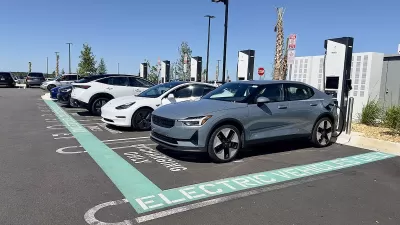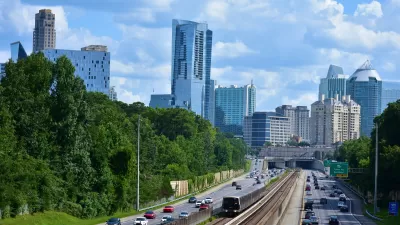Ann Mesnikoff, Director of the Sierra Club Green Transportation Campaign, looks at the CBO's Highway Trust Fund report on the relationship between fuel economy standards and projected gas tax revenues, and finds it too hypothetical.
While a House/Senate conference committee has convened to reauthorize the bill that will fund the federal transportation program, the Congressional Budget Office examines a problem the committee has already encountered: declining fuel tax receipts that are projected to decline even further in the future.
New federal fuel efficiency standards, intended to go into effect in 2017 may save motorists $68 billion in fuel costs by 2030, but may cost the government $57 billion in deprived revenue to the Highway Trust Fund (HTF) between 2012 and 2022. The latter is one of the findings of the Congressional Budget Office (CBO) in a report released May 2 entitled "How Would Proposed Fuel Economy Standards Affect the Highway Trust Fund?"
Mesnikoff agrees that it's important to document how the proposed standards will reduce transportation revenue but takes issue with the time periods used for the projected shortfalls.
Writing in the Sierra Club's energy newsletter, Compass, she indicates that "the CBO notes that improved fuel efficiency would eventually cause annual gas tax revenues to fall by 21% -- in 2040. For some reason, however, CBO chose to apply that out-year reduction in 2040 to the years 2012-2022."
The report has a chart showing that HTF stopped meeting the nation's transportation needs in 2008, requiring transfers from the general fund.
"We can increase gas taxes, make it a sales tax, put a fee on each barrel of oil, or we can start paying per mile we drive," Mesnikoff concludes. "There are other ways to generate revenue. But first, CBO should give us some good math, not a hypothetical."
Thanks to Ann Mesnikoff
FULL STORY: Transportation: $57 Billion? Let's Take a Closer Look

Planetizen Federal Action Tracker
A weekly monitor of how Trump’s orders and actions are impacting planners and planning in America.

Map: Where Senate Republicans Want to Sell Your Public Lands
For public land advocates, the Senate Republicans’ proposal to sell millions of acres of public land in the West is “the biggest fight of their careers.”

Restaurant Patios Were a Pandemic Win — Why Were They so Hard to Keep?
Social distancing requirements and changes in travel patterns prompted cities to pilot new uses for street and sidewalk space. Then it got complicated.

Platform Pilsner: Vancouver Transit Agency Releases... a Beer?
TransLink will receive a portion of every sale of the four-pack.

Toronto Weighs Cheaper Transit, Parking Hikes for Major Events
Special event rates would take effect during large festivals, sports games and concerts to ‘discourage driving, manage congestion and free up space for transit.”

Berlin to Consider Car-Free Zone Larger Than Manhattan
The area bound by the 22-mile Ringbahn would still allow 12 uses of a private automobile per year per person, and several other exemptions.
Urban Design for Planners 1: Software Tools
This six-course series explores essential urban design concepts using open source software and equips planners with the tools they need to participate fully in the urban design process.
Planning for Universal Design
Learn the tools for implementing Universal Design in planning regulations.
Heyer Gruel & Associates PA
JM Goldson LLC
Custer County Colorado
City of Camden Redevelopment Agency
City of Astoria
Transportation Research & Education Center (TREC) at Portland State University
Camden Redevelopment Agency
City of Claremont
Municipality of Princeton (NJ)




























